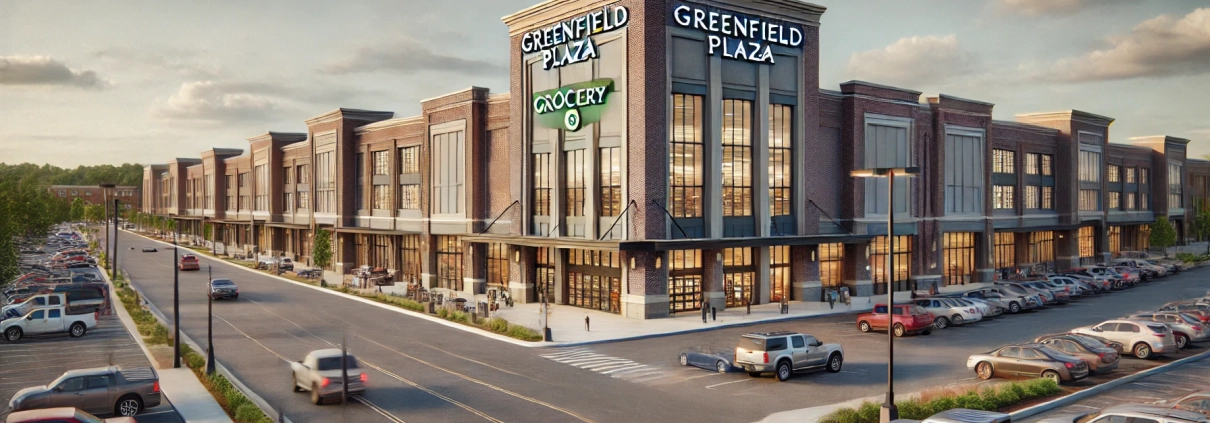Deed of Trust
A Deed of Trust is an agreement between a lender (mortgagee) and borrower (mortgagor) whereby the mortgaged property is conveyed to a third neutral party, usually a title company, to be used as collateral while there is an outstanding mortgage. The mortgagor still holds equitable title, while the trustee holds legal title.
Putting ‘Deed of Trust’ in Context
Clearstream Capital, a private equity firm specializing in core-plus investments, is acquiring Greenfield Plaza, a 98,000-square-foot grocery-anchored retail center located in Birmingham, Alabama. The property includes a well-established regional grocery chain as its anchor tenant, alongside several smaller retail stores and service providers.
To finance the acquisition, Clearstream Capital secures a $12 million loan from a local bank, with a 65% loan-to-value (LTV) ratio based on Greenfield Plaza’s $18.5 million purchase price. Instead of a traditional mortgage, the bank requires the loan to be secured by a Deed of Trust.
How the Deed of Trust Works in This Scenario:
In this case, the borrower (mortgagor) is Clearstream Capital, the lender (mortgagee) is the local bank, and the trustee is a neutral third party—typically a title company or a law firm. The Deed of Trust arrangement means that while Clearstream Capital holds equitable title to Greenfield Plaza (they can operate, lease, and collect income from the property), the legal title is temporarily held by the trustee.
The trustee’s role is crucial in this structure. They hold legal title as a security measure, ensuring the bank’s interests are protected while the loan is still outstanding. If Clearstream Capital defaults on the loan, the trustee can begin the foreclosure process on behalf of the lender, expediting the process compared to traditional mortgage foreclosures.
Why a Deed of Trust?
In Birmingham, Alabama, where this property is located, the use of a Deed of Trust is common. It allows the lender to benefit from a non-judicial foreclosure process, which is often faster and less costly than a judicial foreclosure. If Clearstream Capital defaults, the trustee can sell Greenfield Plaza at auction without needing to go through the court system.
For Clearstream Capital, the Deed of Trust represents a strategic and relatively secure method of leveraging financing, as long as they can service the debt. The local bank, as the mortgagee, benefits from faster recourse to the collateral (Greenfield Plaza) if the loan terms are not met.
Conclusion
In this hypothetical case, the Deed of Trust serves as an efficient tool for both Clearstream Capital and the bank. The real estate private equity firm gains the capital needed for the acquisition of Greenfield Plaza, while the lender is protected by the trustee’s holding of legal title to the property. This structure, often favored in states like Alabama, ensures the rights of all parties are maintained while providing a streamlined process for recourse if necessary.
Frequently Asked Questions about “Deed of Trust” in Commercial Real Estate
What is a Deed of Trust?
A Deed of Trust is a financing agreement where the property is conveyed to a neutral third party (trustee) as collateral for a loan. The borrower (mortgagor) retains equitable title, while the trustee holds legal title until the loan is repaid.
Who are the parties involved in a Deed of Trust?
There are three parties: the borrower (mortgagor), the lender (mortgagee), and a neutral third-party trustee (usually a title company or law firm). The trustee holds legal title to the property as a security for the loan.
How is a Deed of Trust different from a traditional mortgage?
Unlike a traditional mortgage with two parties, a Deed of Trust includes a third party (trustee). It also enables a non-judicial foreclosure process, which is typically faster and less expensive than judicial foreclosure used in mortgage agreements.
Why was a Deed of Trust used in the Greenfield Plaza case?
In the Greenfield Plaza acquisition, the lender required a Deed of Trust to allow for a non-judicial foreclosure in case of borrower default. This method is commonly used in Alabama and speeds up the lender’s recourse to the property.
What role does the trustee play in a Deed of Trust?
The trustee holds legal title to the property on behalf of the lender and borrower. If the borrower defaults, the trustee can initiate a foreclosure sale without court involvement, protecting the lender’s interests.
Does the borrower still have control of the property?
Yes. The borrower retains equitable title, meaning they can manage, lease, and earn income from the property as long as they comply with loan terms and make required payments.
What happens if the borrower defaults on the loan?
If the borrower defaults, the trustee has the authority to sell the property at a public auction through a non-judicial foreclosure process, providing a faster resolution than traditional court-based foreclosures.
Why do lenders prefer Deeds of Trust in certain states?
Lenders prefer Deeds of Trust in states like Alabama because they enable non-judicial foreclosure, reducing costs and delays associated with court proceedings if a borrower defaults.
Click here to get this CRE Glossary in an eBook (PDF) format.

